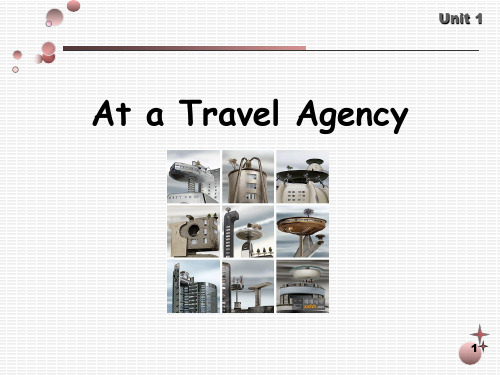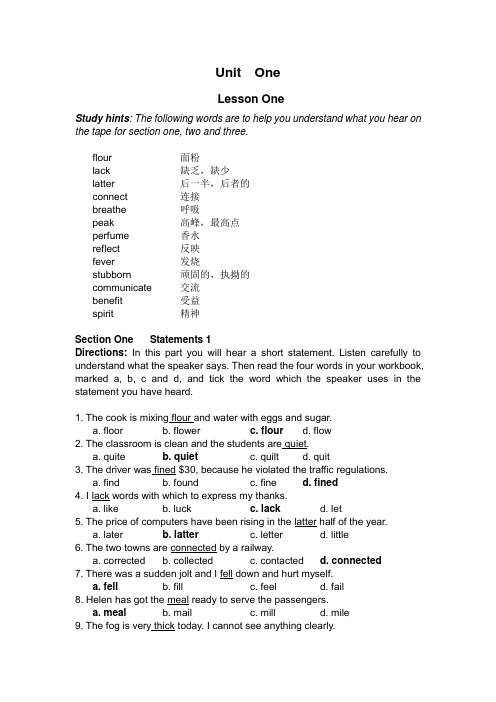民航乘务英语听力教程
民航服务英语听力教学课件u1

5. Thank you for calling. a. Thank you. b. That’s fine. c. Nice talking to you. d. Call back again.
7
Part B Listening Task
Unit 1
Flight Prices Directions: You are going to hear some statements about flight prices. After that some questions will be asked. Find the right answers as quickly as possible.
Unit 1
At a Travel Agency
1
Part A Micro-Listening
Unit 1
I.Directions: You’ll hear one word read from each group. Listen carefully and beside the word you hear.
5
Part A Micro-Listening
Unit 1
II. Directions: You are going to hear five sentences. Choose the answer which is the best response to the sentence you hear.
4. Is that seat taken? a. Please take a seat. b. I don’t think so. c. Why not? d. It’s very nice.
6
Part A Micro-Listening
航空服务英语训练(听力训练)资料

乘务 (11)能按标准检查厨房设施 员 (12)能完成岗位对应的空防
安全检查
(13)能熟练操作舱门设施
(14)能按照规范完成客舱
服务程序
(15)熟悉票务销售相关规定及流程,
地勤 能熟练使用订座系统 人员 (16)熟悉登机相关规定及流程,
能熟练使用离港系统
转换
机上服务 课程
机场服务课程 计算机软件操作课程
汽车驾驶
中外民俗
职业横向拓展 职业综合拓展
航空服务英语训练(听力训练)
1、课程介绍:
《航空服务英语训练(听力训练)》,这门课程是空中乘务专业的核心 课程。总共128课时,分4学期开设,前导课程为《大学英语》;平行课 程 为《航空服务英语训练(口语训练) 》。
《航空服务英语训练(听力训练)》课程主要通过系统的训练,使学生 在贴近实际工作的情景中,培养学生的航空服务工作领域的英语听力, 提高学生英语的沟通和听力水平 。
客舱服务 (48课时)
预先准备 (8课时)
பைடு நூலகம்
直接准备 (14课时)
能
力
航班代码 乘务工作代码
要
机型布局 设施设备
飞行实施 (20课时)
求
广播词 服务程序及标准
舱门操作 语言表达与沟通
航后讲评 (6课时)
航班报告
4、教学内容组织和安排:以“飞行实施阶段”这一子情境为例 飞行实施
迎客
安全 检查
机上 服务
航空服务英语训练 (听力训练)
航空服务 2015年3月
职业能力归纳
(1)能与乘客有效沟通与交流
(2)能熟练进行广播
(3)具有良好的礼仪服务规范,
能进行常规的礼仪服务
(4)能适应长时间高强度、
民航客舱服务英语教程课件

New words expressions
1. Flight attendant stewardess/steward
2. Purser
chief purser
3. Boarding card/pass
4. Rucksack
旅行用帆布背包
Do you think how to become a qualified flight attendant?
A qualified flight attendant
should be friendly, warm-
hearted, patient, helpful,
optimistic,
industrious,
intelligent, confident, courteous
and careful.
The questions met on board.
1. A passenger can’t find his seat. How would you help him? 2. A passenger wants to siቤተ መጻሕፍቲ ባይዱ together with her friend in 6A.
7. aisle seat window seat
过道座位 窗户座位
Group role-play
After watching the movie, please make up the following dialogues.
1). A man who is sitting in economy class wants to move to the first class or business class as he thinks it’s too noisy and crowed here. A flight attendant comes up to help him.
民航乘务英语综合教程 完整版本

Translate the following sentences into English
• 1.空中乘务员与乘客进行面对面的交往。( make contact with) • 2.乘客对航空公司的看法基于乘务员的言谈、举止和服务标准。( base on) • 3.除了对身体有严格的要求外,乘务员应在工作中具有必需的基本素质。( as well as) • 4.他们必须为乘客提供礼貌而高效的服务。 • 5.空中乘务员必须熟悉与飞行有关的信息。( acquaint...with)
•1.广播词给乘客提供最新的飞行信息。( provide...with) •2.飞机即将起飞时,提醒乘客系好安全带。( remind) •3.乘务员在指定的时间给乘客读广播词。( specified) •4.当飞机正飞越在名胜景点上空时,乘务员告知乘客。( advise) •5.由于天气不好,飞机将在备降机场降落。( due to)
• 6. Leave the aircraft quickly in case of fire. • 7. The announcement contains estimated time of arrival, local time and weather
conditons. • 8. Cabin attendants give the pssengers a brief introduction to the airport and the
• 6.为防发生火灾,请迅速离开飞机。( in case of) • 7.通告包括预计到达时间,当地的时间和天气状况。 • 8.乘务员向乘客简单介绍飞机即将到达的机场和城市。( approach) • 9.由于等待飞行许可,飞机推迟起飞。 • 10.飞机现在有些颠簸,请您回原位坐好,系好安全带。( meet with)
民航乘务英语综合教程2

requirements. • 4. They must provide a courteous and efficient service to the passengers. • 5. Cabin attendants must be acquainted with information about the flight.
• 6.为防发生火灾,请迅速离开飞机.〔 in case of • 7.通告包括预计到达时间,当地的时间和天气状况. • 8.乘务员向乘客简单介绍飞机即将到达的机场和城市.〔 approach • 9.由于等待飞行许可,飞机推迟起飞. • 10.飞机现在有些颠簸,请您回原位坐好,系好安全带.〔 meet with
• 6. Leave the aircraft quickly in case of fire. • 7. The announcement contains estimated time of arrival, local time and weather
乘务中级听力Lesson1

Unit OneLesson OneStudy hints: The follow ing words are to help you understand what you hear on the tape for section one, two and three.flour 面粉lack 缺乏,缺少latter 后一半,后者的connect 连接breathe 呼吸peak 高峰,最高点perfume 香水reflect 反映fever 发烧stubborn 顽固的,执拗的communicate 交流benefit 受益spirit 精神Section One Statements 1Directions:In this part you will hear a short statement. Listen carefully to understand what the speaker says. Then read the four words in your workbook, marked a, b, c and d, and tick the word which the speaker uses in the statement you have heard.1. The cook is mixing flour and water with eggs and sugar.a. floorb. flowerc. flourd. flow2. The classroom is clean and the students are quiet.a. quiteb. quietc. quiltd. quit3. The driver was fined $30, because he violated the traffic regulations.a. findb. foundc. fined. fined4. I lack words with which to express my thanks.a. likeb. luckc. lackd. let5. The price of computers have been rising in the latter half of the year.a. laterb. latterc. letterd. little6. The two towns are connected by a railway.a. correctedb. collectedc. contactedd. connected7. There was a sudden jolt and I fell down and hurt myself.a. fellb. fillc. feeld. fail8. Helen has got the meal ready to serve the passengers.a. mealb. mailc. milld. mile9. The fog is very thick today. I cannot see anything clearly.a. sickb. tickc. seekd. thick10. People breathe more slowly when they are asleep.a. breezeb. breathec. breathd. breastStatements 2Directions: Listen to the following statements carefully and fill in the blanks with the numbers you hear on the tape.11. We'll land at Hong Kong at 12:45 and the outside temperature is 28degrees centigrade.12. The phone number of the lost-and-found office is 4217408.13. The Women's Liberation Movement reached its peak in 1960s.14. All the goods in our shop are sold at reasonable price. This new perfumeonly costs $25.99.15. All the students took the exam, but only 1/4 of them passed.16. The sports meeting will be held on Sept. 16th next year.17. The flight No.761 is due to depart at 11:20.18. His address is 118 Kilmorey Street, London.19. The distance from Beijing to Shenyang is 680 kilometers.20. Please open your textbook to page 382.Section Two Spot dictationDirections:Listen to the following passages carefully and then fill in the blanks with the words you hear on the tape.1. The favourite food in the United States is the hamburger, a kind of round sandwich of cooked ground beef. The favourite place to buy a hamburger is a fast food restaurant. At fast food restaurants, people order their food, wait a few minutes, and carry it to their tables themselves. People also take their food out of the restaurant and eat it in their cars or in their homes. At some fast food restaurants, people can order their food, pay for it and pick it up without leaving their cars.There are many kinds of fast food restaurants in the United States. The most numerous sell hamburgers, French fries and milkshakes, which are traditionally popular foods among Americans.In addition, fast food restaurants that serve Chinese food, Mexican food, Italian food, chicken, seafood and ice-cream are very numerous. The idea of a fast food restaurant is so popular that nearly every kind of food can be found in one.Fast food restaurants are popular because they reflect American life style. First, they are not formal restaurants. Customers wear any type of dress when they go to a fast food place. Second, they are fast. People who are busy do not want to spend time preparing their own fast food or waiting while someone else prepares it. In fast food restaurants, the food is usually ready before the customer even orders it. Finally, most food in a fast foodrestaurant is not expensive.2 Helen Keller was born a healthy, normal child in Alabama in 1880. However, an illness accompanied by a high fever struck her when she was still an infant, leaving her deaf, blind, and unable to speak. For little Helen, the world was suddenly a dark and frightening place. She reacted by becoming wild and stubborn.Several years later, a miracle came into Helen's life when Ann Sullivan a strong and loving person, became Helen's teacher. Miss Sullivan's teaching changed a near savage child into a responsible human being. Through her help, Helen Keller learned to communicate with those around her; and as she grew older, others benefited from her unique insights and courage. Miss Keller died in 1967, but her spirit lives on. It lives on in her articles and books and in the stories of people who were lucky enough to meet her during her lifetime.Section Three ConversationsDirections: In this part you will hear a short conversation followed by a question about the conversation. Y ou must choose the most appropriate answer from the four choices marked a, b, c and d.1. M: Y ou have made such progress in speaking English. Do you attend anyEnglish class?W: Y es, I take lessons twice a week, but from next week on, I'll go to the class on Saturday evenings, too.Q: How often will the woman have English lessons from next week on?a. Once a week.b. Twice a week.c. Three times a week.d. Four times a week.2. M: What's the time for departure?W: 5:30. That only leaves us 15 minutes to go through the Customs and check our baggage.Q: At what time did the conversation take place?a. 5:00.b. 5:15.c. 5:30.d. 5:45.3. M: Have you seen our purser?W: No, I haven't seen her since the day before yesterday.Q: When did she last see the purser?a. Y esterday.b. Three days ago.c. Two days ago.d. Early last week.4. M: The football match started 25 minutes ago.W: Really? Oh, it's 9:50.Q: When did the football match start?a. 9:50.b. 9:25.c. 8:55.d. 10:15.5. W: When can the captain see me?M: He won't be free until tomorrow.Q: What does the man mean?a. The captain won't see her tomorrow.b. The captain is busy tomorrow.c. The captain is busy all day today.d. The captain will see her today.6. W: Where have you been? It's 9 o'clock now. The play started 45 minutesago.M: I'm sorry. I got lost.Q: When did the play begin?a. 8:45.b. 9:00.c. 8:15.d. 9:15.7. W: When will you be ready to fix the engines of the plane?M: I've already fixed it.Q: What does the man mean?a. He will be able to fix it.b. He has fixed it.c. He is not able to fix it.d. He will fix it soon.8. M: When will our flight arrive in Paris?W: Well, now it's just eight. We can make it in about two hours, I think.Q: What time will they arrive in Paris?a. At about ten o'clock.b. At about ten to ten.c. At about nine o'clock .d. At about six o'clock.9. W: When is the library open on Sunday?M: From 8 am to 7 pm.Q: How long is the library open?a. 8 hours.b. 8 o'clock .c. 11 hours.d. 11 o'clock.10. M: Are you catching the 12:15 flight to Shanghai?W: Y es. I ordered a taxi for 11:30. It'll be here in 15 minutes.Q: What is the time now?a. 11:15.b. 11:30.c. 11:45.d. 12:15.11. W: Did you meet Dad at the airport?M: Y es. The plane was due at 7:15, but it was delayed a quarter of an hour.Q: When did the plane arrive?a. The plane arrived at 8:15.b. The plane arrived at 7:00.c. The plane arrived at 7:15.d. The plane arrived at 7:30.12. M: Can you tell me the time?W: My watch says 9:30, but I always set it 10 minutes ahead.Q: What time is it now?a. It is 9:30.b. It was 9:30 when I set my watch.c. It is 9:20.d. I set my watch thirty minutes ahead.13. M: We have to hurry if we hope not to miss the beginning of the film. It'salready 7:35.W: Well, it takes only 15 minutes to get to the movies and the film doesn't begin until 7:55.Q: What time will the couple get to the movies if they leave immediately?a. At 7:35.b. At 7:45.c. At 7:50.d. At 7:55.14. W: Has George returned from China yet?M: Y es, but he was only here for three days before his company sent him to Canada.Q: Where is George now?a. China.b. Here.c. Canada.d. California.15. M: I wonder if John will be here by 8:00. He's supposed to be.W: His wife said he left at 7:30. So he should be here by 8:15 at the latest.Q: What time is John supposed to arrive?a. 7:30.b. 8:00.c. 8:50.d. 8:15.16. M: I've heard Baker is leaving for New Y ork City at 9:30 on Sunday. I'll seehim off at the airport.W: Well, no. He's postponed two days and two hours because he couldn't get a seat on Sundays.Q: When is Baker leaving?a. 9:30 on Sunday.b. 11:30 on Monday.c. 9:30 on Tuesday.d. 11:30 on Tuesday.17. M: I was at the entrance of the station at 3:00. How did I fail to meet you?W: I got there at 2:50 and stayed for a while. But I thought I left before you got there.Q: When did the woman probably leave the station?a. At 2:50.b. Before 3:00.c. At 3:00.d. After 3:00.18. W: Hi, Jack. Delighted to meet you. I guess you've been busy these days.When is the graduation party?M: May 20th, that is in ten days. I hope you can come to it, if you are still here.Q: What is the date when the conversation takes place?a. May 20th.b. May 10th .c. May 30th .d. May 11th.19. M: My watch is out of battery. What's the time by your watch?W: My watch says it's 9:35, but it is 7 minutes ahead.Q: What's the correct time now?a. It's 9:28.b. It's 9:35.c. It's 9:42.d. It's 9:07.20. W: Why don't plan to leave your home at 7:15? And I'll try to be there at7:30.M: That may be a little late if we want to be sure of getting good seats. I think I'd rather leave here at seven.Q: At what time will the man probably meet the woman?a. 6:45.b. 7:00.c. 7:15.d. 7:30.Study hints: The follow ing words are to help you understand what you hear on the tape for section four.wave 海浪surface 表面giant 巨大的measure 测量factor 因素historian 历史学家turtle 龟exist 存在pine 松树Celsius 摄氏的minus 负的,减去的Section Four PassagesDirections: In this section, you will hear 15 questions in 3 passages. At the end of each passage, you will hear some questions. Then you must choose the best answer from the four choices marked a, b, c and d.Passage 1 Question 1 to 5 are based on passage 1.Waves are beautiful to look at, but they can destroy ships at sea, as well as houses and buildings near the shore. What causes waves? Most waves are caused by winds blowing over the surface of the water. The sun heats the earth, causing the air to rise and the winds to blow. The winds blow across the sea, pushing little waves into bigger and bigger ones. The size of a wave depends on how strong the wind is, how long it blows, and how large the body of water is. In a small bay big waves never build up. But at sea the wind can build up giant, powerful waves.A rule says that the height of a wave (in meters) will usually be no more than one-tenth of the wind's speed (in kilometers). In other words, when the wind is blowing at 200 kilometers per hour, most waves will be about 20 meters. Of course, some waves may combine to form giant waves that are much higher. In 1933, the United States Navy reported the largest measured wave in history. It rose in the Pacific Ocean to a height of 34 meters.1. What caused waves?a. High temperature.b. Phases of the moon.c. The earth's movement.d. Winds blowing over the surface of the water.2. What factor is not mentioned in the size of a wave?a. How high the temperature of water is.b. How strong the wind is.c. How large the body of water is.d. How long the wind blows.3. What does a rule say about the height of a wave?a. It is usually no more than one eighth of the wind's speed inkilometer.b. It is usually no more than one twelfth of the wind's speed inkilometer.c. It is usually no more than one tenth of the wind's speed inkilometer.d. It is usually no more than one twentieth of the wind's speed inkilometer.4. Which of the following is true?a. Waves are beautiful to look at, but they can destroy ships atsea and houses and buildings near the shore.b. Waves are beautiful to look at, and they cannot destroy ships atsea.c. Waves are beautiful to look at, but they can destroy ships at seaonly.d. None of the above.5. Which of the following is true?a. Big waves can also build up in a small bay.b. Big waves never build up in a small bay.c. Both a and b.d. None of the above.Passage 2 Question 6 to 10 are based on passage 2.For centuries historians and scientists have been searching for the oldest living things. Some turtle live more than a century. But the oldest living things we know are trees.There are several types of long-living trees in California which have existed for about 3000 years. Many of them are still healthy and may live to be the oldest things living on earth. For a long time they were thought to be the oldest, but recently a type of pine was found in California. It showed 4600 rings. This tells us that the tree is 4600 years old.Scientists are searching for the oldest tree alive because it can teach them a great deal about many matters. It will tell them about the climate during the past thousands of years. Also, the amount of rainfall each year is told by the size of each ring.6. What's this passage about?a. Trees.b. Historian .c. Turtle.d. The old living things.7. What shows a tree's history?a. Height.b. Leaves.c. Rings.d. Roots.8. What does the size of each ring tell us?a. The type of tree.b. The amount of sun for a given year.c. Whether a tree is living or dead.d. The amount of rainfall each year.9. What is the oldest living thing?a. Turtles.b. Trees.c. A type of pine.d. None of the above.10. Why are the scientists searching for the oldest trees alive?a. Because they can teach them a great deal about many matters.b. Because they will tell them about the climate during the pastthousands of years.c. Because they can tell them the amount of rainfall each year.d. All of the above.Passage 3 Question 11 to 15 are based on passage 3.And now here's the weather forecast for the next twenty-four hours for the whole of England, Wales, Scotland, and Northern Ireland. Starting with Southern England and the Midlands, it'll be mainly dry and sunny, but quite cold, with temperatures around six or seven degrees Celsius. It should stay dry all day, but there'll be quite a wind, so wrap up warm.And the west country, Wales and Northern Ireland. Y ou can expect some rain in the morning and afternoon and quite strong north easterly winds, and the temperature will be lower than yesterday, around the three or four degrees mark. I don't think you'll see much of the sun: cloudy all day, I'm afraid. The East coast of England will see the best of today's weather. It'll be warmer than yesterday, no winds, and sunshine, so quite warm for the time of year.In Scotland and Northern Ireland, however, there'll be heavy rain and maybe some snow during the afternoon, and on the hills temperatures will drop to below freezing, minus four or five, and on the highest spots minus ten. Over much of Scotland it will be cloudy, and windy too as the cold front moves in over the Atlantic. Northern Ireland can expect the same, but the rain will end before the dark. But again very cold, with temperatures not going above freezing. And that's all from me.11. What does the speaker suggest the people in Southern England andMidlands do?a. To put on more clothes.b. Don't wear too much.c. T o go for an outing.d. T o stay at home.12. Which place has quite strong north and easterly wind?a. Scotland.b. Midlands.c. Wales and Northern Ireland. d. East coast of England.13. Which part of the country has got the best weather??a. Scotland.b. Midlands.c. Wales and Northern Ireland. d. East coast of England.14. What is the lowest temperature on the hills of Scotland and NorthernIreland?a. Six degrees Celsius.b. Three degrees above zero.c. Four degrees below freezing.d. Minus ten degrees.15. Why will the weather be cloudy and windy over much of Scotland?a. Because the warm front moves in over the Atlantic.b. Because the cold front moves in over the Atlantic.c. Because the warm front moves in over the Pacific.d. Because the cold front moves in over the Pacific.。
- 1、下载文档前请自行甄别文档内容的完整性,平台不提供额外的编辑、内容补充、找答案等附加服务。
- 2、"仅部分预览"的文档,不可在线预览部分如存在完整性等问题,可反馈申请退款(可完整预览的文档不适用该条件!)。
- 3、如文档侵犯您的权益,请联系客服反馈,我们会尽快为您处理(人工客服工作时间:9:00-18:30)。
4. A. I like eating eggs very much. B. I try to avoid eating many things. C. Eggs are good for my health. D. I can't eat any eggs.
5. A. Garlic is too smell. I can't stand on it. B. I don't like the smell of garlic. C. Standing on the garlic is terrible. D. Garlic is a smell.
B. I can't see clearly what your duty-free goods are. C. I don't want to buy any of your duty-free goods. D. Your duty-free shop is closed. 13. A. Those children are too noisy. B. Those children are too sleepy. C. Those children are too quiet. D. Those children are too beautiful. 14. A. Please stand up. B. Please take your seat with you. C. Please don't leave your seat. D. Please find your seat quickly.
7. A. Please follow the safety instructions. B. Please watch the safety instructions. C. Please revise the safety instructions. D. Please recite the safety instructions.
9. A. Please put on glasses, denture, and all sharp objects. B. Please take off glasses, dentures, and all sharp objects. C. Please put glasses, dentures, and all sharp objects
continental大陆的 the departure lounge隔离大厅 contraband禁止进出口的物品 poached salmon清蒸鮭鱼 disgusting令人厌恶的 vague不清楚的,模糊的 scented有香味的 be allergic to对…过敏
demonstrate示范 garlic大蒜 dentures假牙 descend下降 baggage allowance免费行李额 invalid无效的 exceed超过,胜过
2. A. My daughter eats a lot. B. My daughter looks small. C. My daughter doesn't eat much. D. My daughter eats nothing..
3. A. The weather is good. B. The weather is bad C. It is foggy. D. It's rainy today.
around you. D. Please display glasses, dentures, and all sharp objects.
10. A. I'm sure you can visit the cockpit. B. The captain will invite you to visit the cockpit. C. I'il show you the way to the cockpit. D. I'm not sure if you can visit the cockpit.
11. A. The toilets are clean. B. The toilets are small. C. The toilets are dirty. D. The toilets need repairing.
12. A. I want to buy something from your duty-free shop.
In this part you will hear a short statement. Tick the answer which is the closest in meaning to the statement you have heard.
1. A. I prefer a big breakfast. B. I prefer a light breakfast. C. I prefer not to have breakfast. D. I prefer breakfast cooked by my mother.
民航乘务英语听力教程
Listening Skills on Cabin Affairs
Study hints: The following words are to help you understand what you hear on the tape for section one, two and three.
6. A. I can't find my no-smoking seat. B. There isn t any no-smoking seat on this plane. C. The no-smoking seats are vacant. D. My no-smoking seat is occupied.
8. A. You can't change your seat after take-off. B. You can change your seat right now. C. You can change your seat after take-off. D. You can't find your seat after take-off.
